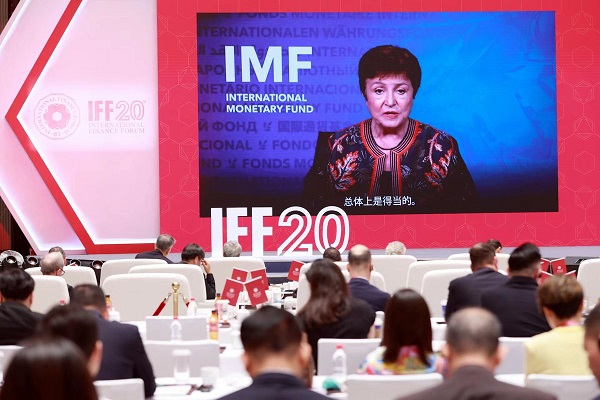China seen as anchor for global economy

Kristalina Georgieva, managing director of the IMF, delivers a speech via video at the International Finance Forum 20th Anniversary and Annual Meeting 2023, which was held from Friday to Sunday in Guangzhou, Guangdong province. [Photo provided to China Daily]
IMF official highlights nation's driving force, contribution amid headwinds
China is projected to contribute more than 30 percent to global economic growth in 2023, highlighting the anchoring role of the world's second-largest economy in a more vulnerable world with rising financial risks, leading experts said at a forum over the weekend.
Kristalina Georgieva, managing director of the International Monetary Fund, said the world has become more shock-prone after three years of COVID-19, conflicts and worsening climate disasters.
The good news is that the global economy has shown resilience, with Asia faring better than other regions. Specifically, China alone is projected to contribute more than 30 percent to global growth this year, Georgieva said.
She added that macroeconomic policies have been appropriate as a whole in China, though there is still room to reorient public spending toward social protection and a need to expedite market-based restructuring of troubled real estate developers.
The remarks were made on Saturday via video at the International Finance Forum (IFF) 20th Anniversary and Annual Meeting 2023, held in Guangzhou, Guangdong province, from Friday to Sunday. The IFF serves as a platform for dialogue and multilateral cooperation, established by financial leaders from more than 20 countries and regions as well as leaders of international organizations, including the IMF.
Echoing Georgieva's views, Han Seung-soo, co-chairman of the IFF and former prime minister of the Republic of Korea, said China's robust growth and financial stability are very critical for the global community at a juncture where higher or more persistent global inflation could trigger a sharp repricing of financial assets that could potentially precipitate a crisis.
Han said that the recent recalibrations in policy focus by the Chinese government — including amplifying consumer confidence, boosting housing demand and buttressing high-quality property developers — are a substantive response to the economic and financial challenges related to property market adjustments.
After China reported a higher-than-expected economic growth of 5.2 percent year-on-year in the first three quarters, the IFF Global Finance and Development Report 2023 — released during the meeting — predicts that the nation's economy will grow by 5.2 percent for the full year, up from 3 percent in 2022.
In 2024, China's GDP growth may come in at 5 percent, the report said, as the government is expected to take further action to ensure the orderly resolution of the debt problems of some large property developers and the sustainability of local government finance. Monetary and fiscal policies will continue to support recovery as well.
Meanwhile, the report predicts the global economy to grow 3.1 percent both this year and next, when tight monetary policy and financial conditions may persist to tackle inflationary pressures. Global inflation, as measured by the growth in the consumer price index, may ease to 5.8 percent in 2024 from 7 percent this year.
Amid sticky inflation that may only ease to central bank targets by 2025 at the earliest in most economies, central banks of major developed economies may keep interest rates high for a relatively long time, said Zhou Xiaochuan, co-chairman of the IFF and former governor of the People's Bank of China, the country's central bank.
This means that global debt and financial risks "deserve attention", Zhou said, calling for strengthening the coordination of macroeconomic, financial and regulatory policies among different countries, especially when managing the spillover effect of developed economies' monetary tightening on developing ones.
All rights reserved. Presented by China Daily









